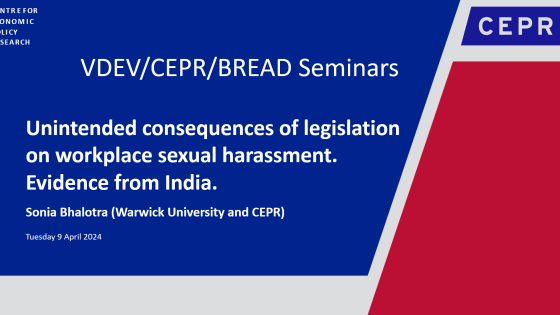The relationship between democracy and development has been extensively debated. Most cross-country analyses suggest that democracy has no robust impact on growth. But using within-country variations, some authors have recently shown that democracy positively affects the rate of growth, notably when transition to democracy is consolidated (Papaioannou and Siourounis 2008a,b; Persson and Tabellini 2009). Elections are the key institutional technology of democracy. As contested elections have become more common, economic policy and governance in developing countries have improved markedly. Figure 1 shows the improvement in the policy rating of the World Bank (Country Policy and Institutional Assessment, (CIPA)), concomitant with the improvement in the Polity indicator (POLITY IV) and the number of elections in developing countries since the late seventies.
Figure 1. Democracy, elections, and economic policy (82 developing countries, 1978-2004)
Source: Authors’ calculations
These improvements accord with the notion that elections discipline governments into improving economic policy and governance. This is the structural effect of elections; they increase accountability. Faced with an election, a government may need to attract votes by adopting policies that are good for the citizens, or at least good for the median voter.
In a recent paper (Chauvet and Collier, 2009), we explore the impact of elections on the quality of economic policy and governance in developing countries. We argue that not only do elections likely have a positive structural effect on economic policy, but they may also have a disruptive cyclical effect. Elections introduce frictions; they are periodic events, the timing of which may affect politicians’ incentives to reform. We also argue that achieving accountability in developing countries requires more than elections. When the quality of the electoral process is poor, elections simply do not create the structural effect we would expect.
What is the net effect of elections on economic policy?
We explore the factors that lead to a year-on-year improvement in economic policy and governance, as measured by the CPIA. A dummy variable for election years (from the Database of Political Institutions, Beck et al., 2001) does not influence the probability that policy will improve. This result mainly reflects the fact that a dummy for election years compounds the two possibly offsetting effects of elections, i.e. a structural accountability effect and a cyclical disruptive effect.
In order to disentangle the two effects, we introduce into our estimations proxies for the structural effect of elections (the frequency of elections) and for their cyclical effect (the number of years that separate each year from the nearest election). We find that elections in developing countries have both a cyclical and a structural effect on policy.
The cyclical effect suggests that mid-term is more propitious for policy improvement. At the mean of other characteristics and for an electoral cycle of six years, the probability that policy will improve increases from 0.37 in the year of the election to 0.44 during the mid-term. Hence, the effect is not large but worth bearing in mind; by choosing the right moment for change, the probability of success is increased by around 20%.
The structural effect of elections is also significant and quite large. The degree to which they improve policy depends upon their frequency; the more frequent, the better. The net effect of higher frequency has to be computed while allowing for the implications of each frequency for the cyclical effects. A lower frequency reduces the adverse effect of an election year compared to the mid-terms. The net effect of different frequencies on the probability of policy improvement is quite large. Taking the extremes of the range, shifting from an election once a decade to an election each year would almost double the chance of policy improvement in the average year.
Does this mean that concerns about elections are unwarranted?
Doubts over the efficacy of elections in developing countries are particularly centred on the scope for subverting them. Incumbents can resort to several illicit means of retaining power, in which case they are released from the discipline of adopting good policies in order to win votes. We explore whether the conduct of elections affects their structural efficacy for policy improvement. We use information provided by the Database of Political Institutions relating to electoral competitiveness (based on the proportion of seats won by the opposition) as a proxy for the quality of elections. We find that the quality of elections matters for the efficacy of elections. It seems that the favourable effects of elections depend upon them being of reasonable quality. Low-quality elections have no significant effect and indeed may actually worsen policy. Our results suggest that if elections are of low quality, the less frequently they are held the better. These results are consistent with theory. If governments are able to win elections by illicit tactics, they are not disciplined by them and won’t improve policy or governance.
An election that is not “free and fair” is a broken technology; it cannot be expected to hold governments accountable to citizens. Hence, the overall conclusion from our analysis is that the frequency and conduct of elections matter. Our results suggest that elections are a key instrument in achieving accountability. But elections fail to achieve accountability if they are infrequent or uncompetitive.
References
Beck T., Clarke G., Groff A., P. Keefer and P. Walsh (2001), “New Tools in Comparative Political Economy: The Database of Political Institutions”. World Bank Economic Review 15(1), 165-176.
Chauvet L. and P. Collier (2009), “Elections and Economic Policy in Developing Countries”. Economic Policy 24(59), 509-550.
Papaioannou E. and G. Siourounis (2008a), “Democratisation and growth”, VoxEU.org, 25 October.
Papaioannou E. and G. Siourounis (2008b), “Democratization and Growth”. Economic Journal 118(10), 1520-15551.
Persson T. and G. Tabellini (2009), “Democratic Capital: The Nexus of Political and Economic Change”. American Economic Journal: Macroeconomics 1(2), 88-126.




